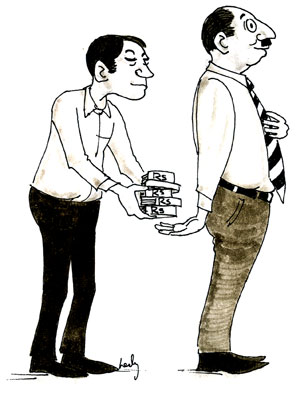The Ombudsman and state sector rejuvenation
Shenali WADUGE
A government that is concentrating on development needs to realize
that their performance is judged primarily through the manner in which
it is able to lead and spearhead the performance of its public sector.
State employees are key to turning the satisfaction quotient of the
public favourably.
When the public has to deal with unsuitable officials, unqualified
civil servants, officials with poor PR skills, incompetent staff,
irregularities, malpractices, corruption and bribery - these together
result in the public becoming totally dejected with the government in
power.
There certainly needs to be changes to the present pattern of
lifelong tenure positions based on seniority.
These need to be tied to good performance evaluation systems wherein
the best performers are given opportunity to rise and given key posts
and portfolios.
Eradicating corruption
 Though Sri Lanka is not required to follow blueprints adapted by
other countries it is good to see how and why corruption strategies have
worked in countries and Singapore is a good case study. It is not that
Singapore is without corruption but the essentially important feature is
that Singapore has succeeded in curbing corruption and changing people’s
mindset to abhor corruption. Singapore has implemented the Prevention of
Corruption Act and the Corrupt Practices Investigation Bureau to
spearhead anti-corruption strategy. The key role of the CPIB is to curb
corruption by reducing the opportunities for corruption and by
increasing the price to be paid for corrupt behaviour. Though Sri Lanka is not required to follow blueprints adapted by
other countries it is good to see how and why corruption strategies have
worked in countries and Singapore is a good case study. It is not that
Singapore is without corruption but the essentially important feature is
that Singapore has succeeded in curbing corruption and changing people’s
mindset to abhor corruption. Singapore has implemented the Prevention of
Corruption Act and the Corrupt Practices Investigation Bureau to
spearhead anti-corruption strategy. The key role of the CPIB is to curb
corruption by reducing the opportunities for corruption and by
increasing the price to be paid for corrupt behaviour.
Eradicating corruption necessarily implies that no one is above law
and there is no discrimination on who is to be punished if caught. Which
means rich or poor, influential or not there cannot be double standards.
We all know that Imelda Marco possessed 3,000 pairs of shoes and 2,000
ball gowns. It won’t take us much time to figure out other examples of
politicians and families living ostentatious lifestyles.
Malpractices and irregularities
Therefore in desiring to deal with the issue of corruption the most
important lesson that needs to be applied is that the methods adopted
must be comprehensive and must not have loopholes and must be
continuously reviewed and amended where necessary and when necessary.
Thus those tasked to ensure that malpractices and irregularities do
not occur in the public sector must be totally incorrupt and the
selection of these team of men and women must be given top priority.
A general grievance by state employees is that they are not paid on
par with private sector employees.
Given that salaries are a key component in prompting men and women
towards corrupt practices by having a system where those caught in any
type of malpractice including firing from service will lead to the
desired reduction in state staff which will certainly enable a
restructuring of salary with higher perks for the good officers who
remain.
The Ombudsman was created in 1978 by the Second Republic
Constitution. For an entire island Sri Lanka has just one Ombudsman with
just 15 staff and no branch offices to cater to grievances against
Public Sector officials.
There is something radically wrong in this and needs to be quickly
addressed.
Empowering the Ombudsman who has authority given by legislature to
address grievances and allowing the public to participate in the
exercise of curbing corruption would certainly lead to a better state
apparatus when the state employees realize that the public have a place
to freely lodge their grievances against public officials and assurance
that actions against these officers will be taken and publicly
highlighted.
When public sector employees realize they are being scrutinized and
the public is watching their every move and that repercussions for those
found guilty would lead to poor performance ratings linked to promotions
and salary increments even firing or transfers, automatically the public
sector would fall into line and politicians themselves would realize a
thing or two themselves.
Performance ratings
The importance of this suggestion is to bring the public and the
Ombudsman closer and to empower the Ombudsman to bring to light all
officers (junior or senior) who engage in corrupt practices. Similarly
it is good for the Public Administration Ministry to derive a new
structure to give opportunities for high performers, for those having
poor performance ratings to be denied automatic promotions etc as had
happened in the past.
State sector
A good example of giving high performers the mantle of leadership was
seen in the manner Sri Lanka’s armed forces changed its structure to
allow junior officers to lead the final battle against the LTTE and
achieve the desired results.
Those in authority can take this suggestion further by looking at the
modalities but given that it is the public that deals with public sector
employees on a daily basis it is they who are best equipped to praise or
admonish officers/officials they deal with and if they are properly
linked to an empowered Ombudsman who is given the authority and manpower
to handle these grievances we can begin to think that corrupt practices
in the state sector can see a desired decline.
Preparing papers, workshops and opening authorities is unlikely to
reap the desired results until and unless the people that is the public
of Sri Lanka are involved in this exercise in partnership with a
Parliament approved Ombudsman who can be properly tasked to punish
officials for their wrong doings. |



